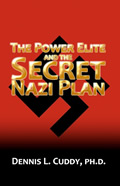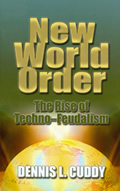THE POWER ELITE AND THE MUSLIM BROTHERHOOD
PART 13
By
Dennis L. Cuddy, Ph.D.
May 28, 2012
NewsWithViews.com
The power of the Muslim Brotherhood (MB) can be seen across the Middle East and North Africa, where it is linked in Tunisia to the Ennahda Party, which has a majority of the seats in Parliament. In Jordan (which is heavily dependent upon US and Saudi aid), though, the MB is facing a smear campaign by the Mukhabarat (intelligence service), which is trying to link the Jordanian Brotherhood to the CIA and British MI6. The MB in Jordan has been pragmatic in the past, actually supporting King Hussein there decades ago, but switching to opponents of the regime especially after Jordan signed a treaty with Israel in 1994.
Elsewhere, the MB and its offshoots have displayed a practical approach as well. Palestinian MB-offshoot Hamas has a tentative de facto truce with Israel.And the Iraqi Brotherhood joined in the US-sponsored government of that nation during the American occupation after the fall of Saddam Hussein.
In Egypt, the presidential elections began May 23-24 (with a runoff scheduled for June 16-17), with Christians fearing the election of an Islamist. After 2 days of voting, the top vote-getter entering the runoff is Mohammed Morsi (with about 25.3% of the vote), the MB's replacement for Khairat al-Shater (leading MB financier) who was disqualified on April 14.
Morsi was able to come from behind in the last week of the campaign because of the MB's organizational prowess (see "Egypt Brotherhood forms human chain for candidate,” Al Arabiya News, May 18, 2012 regarding the MB's organizing a 470-mile-long human chain of Morsi supporters from Cairo to Aswan). The MB also told the people of Egypt they weren't just voting for a man, Morsi, but for a strong and capable organization which could effectively run the Egyptian government and manage the economy. In an 80-page document, the Egyptian Brotherhood described its policies in some detail regarding Sharia (Islamic) law, relations with other Muslim nations like Turkey, etc.
The main reason the MB in Egypt in March decided to reverse its position of not fielding a presidential candidate was that although they had achieved almost a 50% majority in the parliamentary elections, they have been blocked by the military generals’ ruling council and its appointed governing body (which is running the country until a new president is elected). Even if the MB candidate wins the presidency in the runoff, and the MB has its way in parliament, the generals may try to retain much of their power.
The Brotherhood’s deputy leader Mahmoud Ezzat “envisages the presidential election as the start of an 8-year struggle with the military establishment that will do all it can to preserve an economic empire including factories, land holdings, and petrol stations” (see “Brotherhood faces new challenges in Egypt power quest” by Reuters’ Tom Perry in Cairo, Al Arabiya News, May 16).
As of May 16, former prime minister and “law and order” candidate Ahmed Shafiq was leading (but with a large 33% of voters undecided) in a poll by Baseera (an independent survey center) with 19.3%, followed by former foreign minister and Arab League head Amr Moussa (who has criticized Israel and American policy, and had led in weekly polls until May 20) with 14.6%. They were followed by Morsi and then by Abdel Moneim Abul Fotouh with 12.4%.
As a former MB leader, Fotouh drew support away from Morsi. Fotouh also wanted to revise Egypt’s 1979 treaty with Israel, as does Moussa. In a debate with Moussa, Fotouh called Israel a “racist state” and an “enemy.” Also, in an interview on Egyptian TV channel CBC, Fotouh remarked: “I still view the peace treaty as a national security threat to Egypt, and it must be revised. It is a treaty that forbids Egypt from exercising full sovereignty in Sinai and allows Israelis to enter Sinai without visas, while they need visas for Cairo.” He also described the killing of Osama bin Laden by U.S. Special Forces as an “act of state terrorism.” (See this article.)
According to “Two Egyptian Presidential Candidates Endorsed Jihad Against Us” (Breitbart.com, May 4, 2012), Fotouh called himself a “moderate” Islamist who “co-founded the Al-Nahda party, which sees Islam as central to Egypt. Supported by Salafi Islamists, Gama’s Islamiyya, the Islamist group Wasat, and Google executive Wael Ghonim, he said in 2004: ‘Like all members of the Muslim Brotherhood in Egypt and around the world, I personally hope to have a chance to bear arms to confront the U.S. occupation in Iraq…. This is a matter of religion, not of politics. When a Muslim land is occupied, jihad becomes an individual duty.’” In this same Breitbart.com article, one can also see presidential candidate Hamdeen Sabahy (a leftist who was elected to Parliament in 2000 and 2005, and who was supported by those dissatisfied with Islamists and former Mubarak ministers as presidential candidates) in 2005 remarking: “When a weapon is pointed at the Americans it is good. Any weapon that kills an American is good. Any gun pointed at the Marines is good. Any kidnapping or slaughtering of an American in Iraq is good…. One must salute this organization (Al Qaeda) when it kills any American soldiers—a soldier, not a civilian. The presence of Al Qaeda in Iraq as part of the resistance is a positive phenomenon that should be supported. I support Al Qaeda when it kills Americans” (archival footage of Fotouh and Sabahy making their statements can be seen on MEMRI TV).
| Subscribe to the NewsWithViews Daily News Alerts! |
As of Saturday (May 26), the candidate following Morsi with the most votes (24%) was Shafiq. However, Sabahy, with 22% of the votes, announced he will appeal the results because of alleged voting irregularities and a pending ruling regarding Shafiq’s right to stand for election (a new law banned top Mubarak-era officials from the presidential race). The MB’s Morsi will reach out to former MB leader Fotouh’s supporters in the run-off, but revolutionary activists face a difficult choice. Supporting Mubarak’s Prime Minister Shafiq (if Sabahy’s appeal fails) would mean the revolution failed, but supporting Morsi would bring Islamist rule with all its restrictions based upon Sharia.
The outcome of the runoff on June 16 and 17 could be very important, depending upon the relative powers of the president (and parliament, judiciary and military) as defined in the new constitution. Currently, though, there is still a struggle over who should write the constitution. The military has said it will turn over power to civilian rule after a president is elected, but many believe a deal may be made behind the scenes allowing the generals to retain much of their power.
� 2012 Dennis Cuddy - All Rights Reserved
Click here for part -----> 1, 2, 3, 4, 5, 6, 7, 8, 9, 10, 11, 12, 13, 14,










 Share
This Article
Share
This Article






